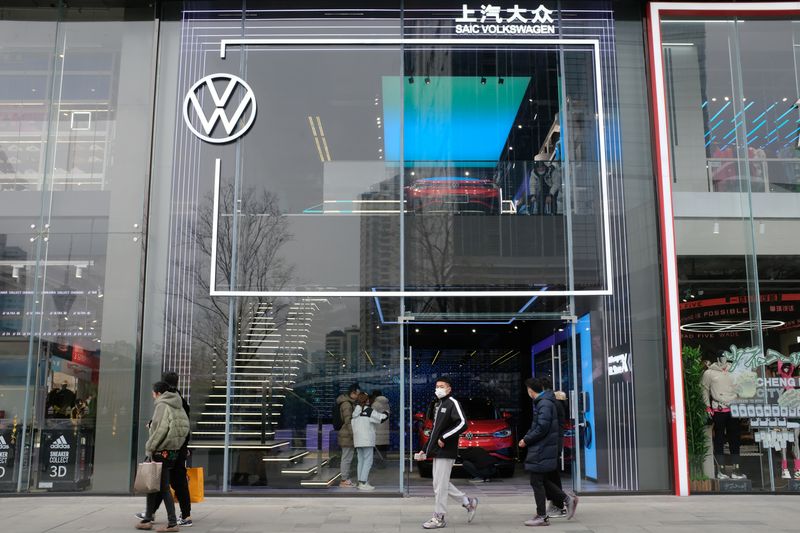By Victoria Waldersee
BERLIN (Reuters) - While investors welcomed Volkswagen (ETR:VOWG_p)'s decision to audit its jointly-owned plant in Xinjiang, China, some are questioning how it will be run and whether it is enough to eliminate the risk of forced labour in the supply chain.
Deka, Union Investment and the Dachverband Kritische Aktionaere (Umbrella Organisation for Critical Shareholders) were among those to call on VW at its annual general meeting last month to commission an audit of the plant in Urumqi, Xinjiang, where it assembles cars for sale in the region.
The UN and rights groups estimate that more than a million people, mainly Uyghurs and other Muslim minorities, have been detained in recent years in a vast system of camps in Xinjiang and used for low-paid and coercive labour.
China denies any human rights abuses in the western region.
Volkswagen's China chief visited the plant earlier this year and said he saw no signs of forced labour, but some investors demanded an external audit, with Union Investment warning Volkswagen in May that it would be removed from its sustainability funds if it did not do so within a month.
On Wednesday, Chief Executive Oliver Blume committed to arranging an independent audit this year, but it is not yet known who will run it, how wide-ranging it will be and how the results will be shared.
Volkswagen has said previously its joint-venture partner at the plant SAIC would have to agree to the audit.
Blume said the two companies were in a "fruitful exchange".
A Volkswagen spokesperson on Thursday declined to say whether SAIC had demanded conditions on the audit.
"This audit must be carried out promptly for Volkswagen to remain investable," Janne Werning of Union Investment said, adding it must also be done by a reputable firm and the results shared publicly in full.
Ingo Speich, head of sustainability and corporate governance at Volkswagen top-20 shareholder Deka, commended the decision to move ahead with the audit as a "clear signal towards creating transparency," but said a recognised firm must run the audit.
Still, a sweeping crackdown on consultancy and due diligence firms in China, some of which refuse to audit in Xinjiang because of heightened difficulty of ascertaining reliable reports there, raises questions on how reliable the outcome will be, the Umbrella Organisation for Critical Shareholders said.
"Germany's export control office urgently needs to clarify whether it considers measures such as external audits to be appropriate and effective in authoritarian states," co-director Tilman Massa said.
That office oversees and enforces German law introduced this year which requires larger companies to establish due diligence procedures to prevent human rights and environmental abuses within their global supply chains.

The audit will not dampen a legal case brought against the carmaker on Wednesday by Berlin-based rights group ECCHR, which demands more evidence on how Volkswagen tracks the risk of forced labour not only at its plant but at any suppliers or sub-suppliers with links to Xinjiang.
"No worker can speak freely without putting himself and his family in danger," a spokesperson for human rights group World Uyghur Congress said. "We have serious doubts about how Volkswagen intends to conduct an independent review."